EDITORS' NOTE
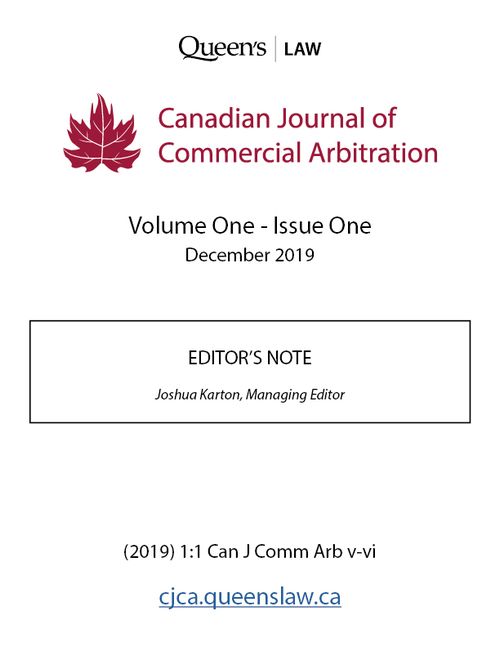
- Author
- Joshua Karton
- Pages
- v-vi
- Introduction
- We are delighted to present the inaugural issue of the Canadian Journal of Commercial Arbitration, published in association with the Queen's University Faculty of Law and Juris Publishing. It is our hope that this journal will become not only a useful source of information for Canadian arbitration practitioners and scholars—and practitioners and scholars elsewhere with an interest in Canadian arbitration—but also a focal point of our vibrant and growing professional community. CJCA seeks to bridge the gap between practice and academia. Each issue of CJCA will contain both “news you can use” in your next counsel engagement or arbitral appointment and broader thematic or theoretical discussions that explore international arbitration law and practice in thought-provoking ways.
CANADA’S PLACE IN THE WORLD OF INTERNATIONAL ARBITRATION

- Author
- Professor Janet Walker, C. Arb
- Pages
- 1-11
- Introduction
- On the occasion of the first issue of the Canadian Journal of Commercial Arbitration, it is fitting to include a perspective on the international arbitration community in Canada, its history to date, and its prospects for playing a significant role on the world stage in the years to come. This brief article, fashioned from a recent speech given by the author, provides such a perspective. It begins by recounting key events in the development of the field in Canada and acknowledging a number of the individuals who have contributed to that development. It goes on to describe the economic importance of promoting major Canadian centres as seats and hearing venues for international arbitrations; and it concludes with some observations on the prospects for fostering a legal community to support Canada as an important centre for international arbitration.
COMPETENCE-COMPETENCE IN CANADA: A BAROMETER OF COURT SUPPORT FOR COMMERCIAL ARBITRATION
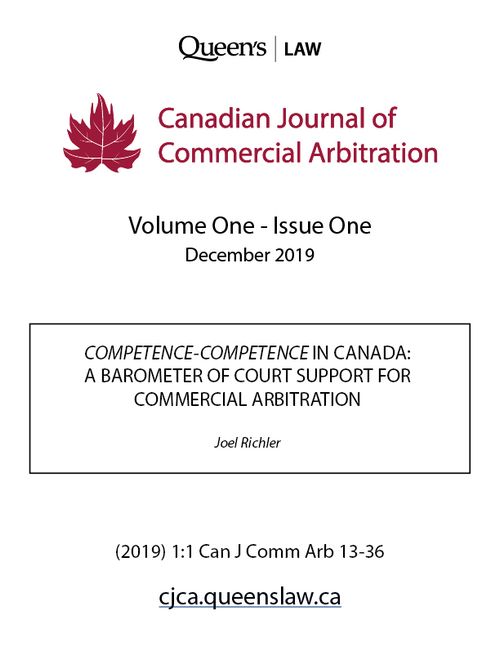
- Author
- Joel Richler
- Pages
- 13-36
- Abstract
- The courts in Canada, its provinces and territories have all expressly adopted competence-competence in international commercial arbitration legislation. This adoption is consistent with broad and strong support for commercial arbitration as a vibrant alternative to litigation as a means of resolving domestic and international commercial disputes. The doctrine is further supported by arbitration statutes that require courts to stay litigation commenced in the face of arbitration agreements save for limited exceptions. Canada’s courts have implemented positive effect competence-competence by empowering tribunals to determine (at least provisionally) their own jurisdiction, and negative effect competence-competence by requiring the remittance of jurisdiction questions to arbitral tribunals, subject to limited exceptions. By virtue of two Supreme Court of Canada (SCC) decisions, courts may (not shall) on a principled basis only make determinations of jurisdiction where the issues are questions of law alone (a very rare occurrence), or where the questions are of mixed fact and law that can be determined on the basis of a superficial review of the evidence, and provided that stay applications are not brought for improper delay purposes. Canadian legislation and courts thereby provide full support to international arbitration by deferring to arbitral tribunals, subject only to residual court discretion as prescribed in limited circumstances.
SETTING ASIDE: EXCESS OF JURISDICTION OR ERROR OF LAW? — A SECOND KICK AT THE CAN

- Author
- J. Brian Casey
- Pages
- 37-59
- Introduction
- Over the last 10 years, Canada has witnessed an amazing growth in the use of arbitration to resolve commercial disputes. As it has moved into the mainstream of commercial dispute resolution, arbitration has attracted the trappings of—and some would say, the baggage attendant with—judicial dispute resolution. In particular, the benefit of finality has bumped into the legal profession's usual expectation of challenging decisions that do not meet their clients’ expectations. Commercial clients are content to articulate the arbitration tropes of efficiency and finality, until they lose, at which time finality no longer looks as attractive as it did when the arbitration agreement was entered into.
REMOVING AN ARBITRATOR FOR INCAPACITY OR UNDUE DELAY
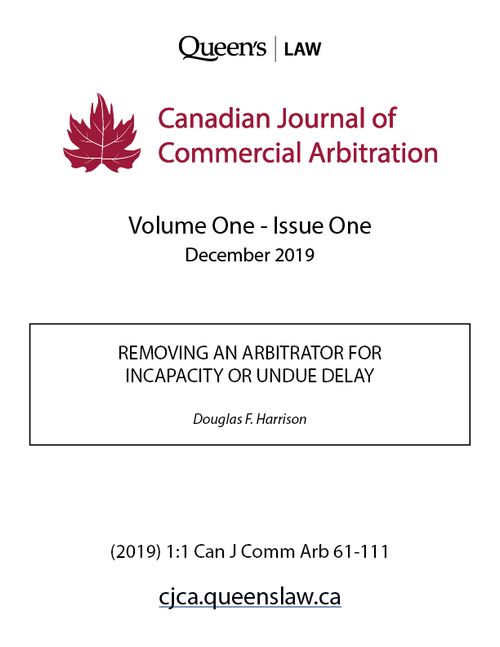
- Author
- Douglas F. Harrison
- Pages
- 61-111
- Introduction
- During your arbitration hearing, you notice the chair of the tribunal looks unwell but you keep your thoughts to yourself. The chair then announces one day that he will need to adjourn the hearing for a week, for personal reasons. During this break, you learn that he is seeing an oncologist. With some trepidation, since this is an ad hoc arbitration, you write a letter to the tribunal saying, as discreetly as possible, that if any of its members are having health issues and need to step down from the proceeding, you and your client will do whatever is necessary to accommodate everyone. Upon reconvening the hearing, the chair begins by telling counsel that the matter will wrap up that week and they need not worry about anyone’s health issues; as for himself, he will be the judge of his own condition. However, during that final week, the chair is increasingly distracted and non-communicative. After the hearing ends, you hear nothing from the panel, and the 60-day deadline set out in the arbitration agreement for the delivery of the award comes and goes. Months pass and no award is delivered. You then receive an email from a close friend of your party-appointed arbitrator, who says that no one has heard from the chair since the final day of the hearing. Now what?
LIKE A POOR MARKSMAN, ONCA KEEPS MISSING THE ARBITRATION TARGET: DISCUSSING DISNEY V. REINSURANCE, HELLER V. UBER, AND HUALAN V. MARTY
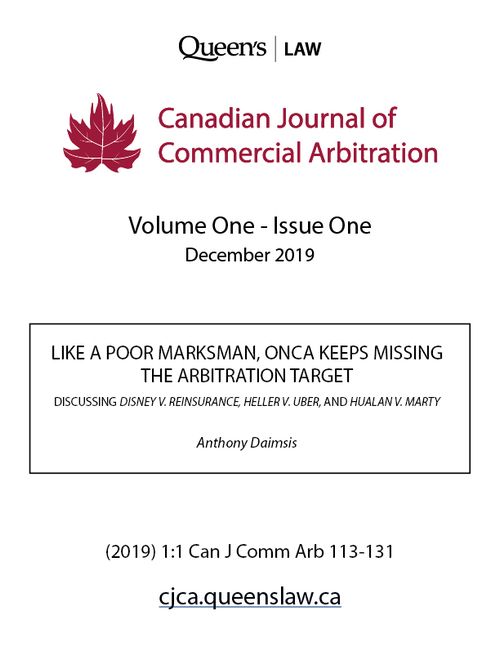
- Author
- Anthony Daimsis
- Pages
- 113-131
- Introduction
- This comment calls out the struggles of the Court of Appeal for Ontario (“ONCA”) with foundational arbitration principles like seat theory, competence-competence, and, uniformity in applying legal instruments on international arbitration. The ONCA’s struggles risk exposing Ontario as an undesirable arbitral seat. Any good arbitration’s protagonist is the tribunal, but even the best tribunal needs a good supporting cast in the form of supervisory courts. Ontario courts must adapt to fit the part...
AMERICAN ECHOES IN TELUS V. WELLMAN: DISCUSSING TELUS V. WELLMAN AND HELLER V. UBER
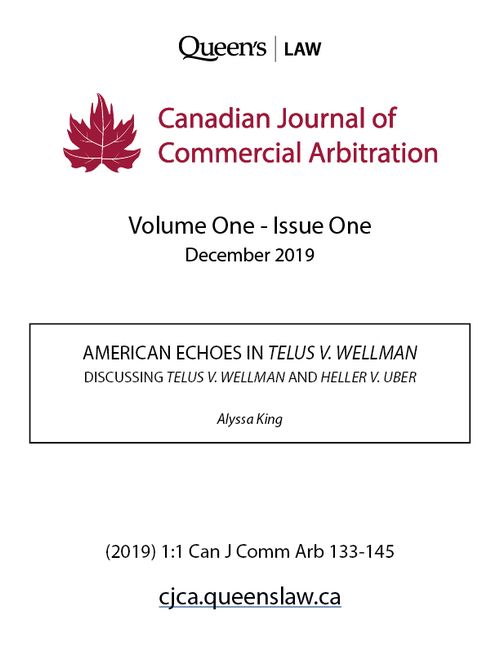
- Author
- Alyssa King
- Pages
- 133-155
- Abstract:
- In Telus Communications Inc v. Wellman (Wellman), the Supreme Court of Canada held that section 7 of the Ontario Arbitration Act does not allow a judge the discretion to refuse to enforce a valid arbitration clause with respect to some plaintiffs when the same arbitration clause is invalid with respect to other plaintiffs. The five-justice majority had the better of the statutory argument.
However, the dissenters were right to be concerned about the decision’s policy implications. Wellman has disturbing echoes of the US class arbitration debacle, in which some companies have been able to use individual arbitration clauses to avoid liability for regulatory violations. However, Ontario has a good chance to avoid such a result, particularly if the Supreme Court of Canada looks more favourably on the Court of Appeal’s unconscionability analysis in Heller v. Uber Technologies Inc (Heller).